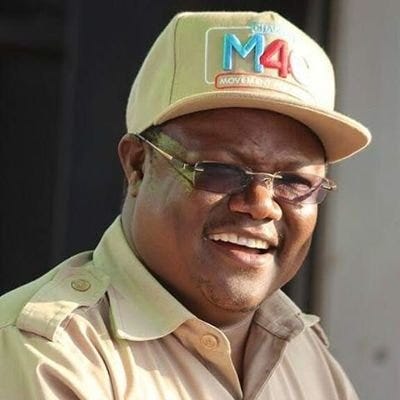🔅 For Somali Diasporans, ‘Going Home’ Means Nairobi
Miss Ivory Coast Pageant Bans Wigs and Weaves

Good morning from… Can you guess where in Africa this is? (Answer at the bottom!)
For Somali Diasporans, ‘Going Home’ Means Landing in Nairobi

In 2020, Abdirizaq Hassan did the unthinkable: he left the hustle-bustle glamour of LA and hopped a plane to Nairobi, Kenya. You might ask, “Why not head straight to Somalia?” But here’s the truth: for a new wave of Somali returnees raised in the West, Kenya is the perfect middle ground – close enough to “home,” minus the instability.
Born in Hargeisa, Hassan moved to the U.S. as a kid, but when Covid hit, nostalgia did, too. The only hiccup: actual Somaliland lacks the infrastructure for a blossoming clothes empire (which is what he does) and war-torn Mogadishu is… complicated. So, with his half-packed suitcases, Kenya became the next best thing. Nairobi boasts stability, global connectivity, and a robust Somali community that offers all the creature comforts – sambusas included.
Kenya’s economy is now reaping the benefits: Thousands of well-educated, second-generation Somalis – from doctors in private clinics to real-estate tycoons flipping apartments – have invested in the country. There is a sharp contrast between the East African country and the West, where Somalis talk about feeling stuck in mid-level jobs, and hitting an invisible ceiling no matter how many degrees they rack up
But don’t be fooled. Nairobi is no utopia – traffic’s insane, bureaucracy can be hair-pulling, and xenophobia rears its head now and then, especially in politically tense moments. Somalis remember the Al-Shabaab terror attacks a decade ago, when local attitudes sometimes turned frosty.
For many, though, those inconveniences beat microaggressions or job ceilings back in Minnesota or Manchester. Especially for parents, who want their children to be seen as individuals, not as some ‘suspicious young Black men.’
Ultimately, for diaspora Somalis, “returning home” can be complicated. After all, many left Somalia as kids and built second lives in America or Europe. But in Nairobi, they’ve found a sweet spot: culturally familiar, yet modern enough to launch a business and shop for almond milk at the local supermarket.
So yes, you’ll hear them joking that they’re “Somali, by way of Canada, settled in Kenya.” Some might go to Hargeisa or Mogadishu when the time is right – but for now, Nairobi offers enough stability, creativity, and sense of belonging that they may never leave. As Hassan puts it with a grin: “Things just make sense here.”
West Africa’s Miss Ivory Coast Pageant Bans Wigs and Weaves

The Miss Ivory Coast pageant is going au naturel, ditching all the synthetic locks and telling contestants to rock their own hair during the preliminary stages. You are allowed twists, braids, or blowouts – anything, just so long as it’s yours. This decision aims to tackle two hurdles: break the pricey barriers of big-ticket beauty routines, and shift attention to more “raw” African aesthetics.
“We want the candidates to be natural,” says pageant boss Victor Yapobi, who also lowered the entry fee and upped the max age to 28. While fans of wigs and weaves call foul on the “attack” on “protective styles,” others love it. “It gives me more pride as an African woman,” says 21-year-old contestant Emmanuella Dali.
For now, the no-fake-hair rule only applies to the 13 local pageants and two international prelims. There’s no word yet on whether the final, set for late June in Abidjan, will force the top 15 to keep it real, too. Either way, the big question is: Will this push for natural hair truly champion authenticity, or just swap one standard for another? We’ll find out on the catwalk.
Tanzania: Opposition Party Benched After Leader Charged with Treason
In case anyone thought Tanzania’s 2025 elections were going to be a fair fight – think again. The country’s main opposition party, Chadema, has just been kicked off the ballot.
Why? Because they refused to sign a “code of conduct” document, a move the elections commission says automatically disqualifies them not just from October’s general election, but from all elections until 2030.
Chadema’s no-show was a statement: The party, led by Tundu Lissu, has been loudly demanding electoral reforms under the slogan "No Reforms, No Election"—arguing that elections can’t be free and fair if the electoral commission is basically handpicked by the sitting president, Samia Suluhu Hassan.
But that message seems to have come at a high cost. Last week, Lissu was arrested after a rally where he called for those very reforms. Authorities promptly charged him with treason, accusing him of trying to incite rebellion. He’s now sitting in custody, with his trial pushed to later this month. His lawyer called the charges what most people were already thinking: pure politics.
And this isn’t Lissu’s first rodeo with danger. Back in 2017, he survived an assassination attempt when his car was sprayed with bullets. He went into exile, popped back briefly in 2020 to run against then-president John Magufuli (he lost and cried foul), and returned again in 2023 after Samia promised a new era of political openness.
Fast-forward to today, and that “openness” is looking a lot like a trapdoor. Opposition parties and campaigners say Samia’s government has doubled down on arresting and intimidating critics, despite earlier hopes that she would pull back from Magufuli’s strongman playbook.
Meanwhile, Tanzania’s ruling party, CCM, is on track to extend its five-decade winning streak, now without Chadema getting in the way. Critics say the election is shaping up to be more coronation than competition.
Food for Thought
“Not to know is bad, not to wish to know is worse.”
— Gambia Proverb
And the Answer is…
The photo is taken from Mauritania! You can also send in your own photos, alongside the location, and we’ll do our best to feature them.



